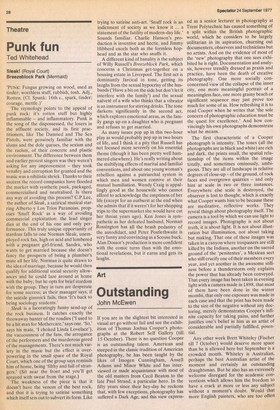Theatre
Punk fun
Ted Whitehead
Steak! (Royal Court) Breezeblock Park (Mermaid) PUNK: Fungus growing on wood, used as tinder; worthless stuff, rubbish, tosh. Adj., Rotten. (Cf. Spunk: 16th c., spark, tinder; courage, mettle.)' The etymology points to the appeal of punk rock: it's rotten stuff but highly inflammable — and inflammatory. Punk is the song of the dispossessed, the losers in the affluent society, and its first prac titioners, like The Damned and The Sex Pistols, were genuinely familiar with the slums and the dole queues, the sexism and the racism, of their concrete and plastic environment. The difference between them and earlier protest singers was they weren't asking for any improvement — they took venality and corruption for granted and the music was a nihilistic shriek. Thanks to their success the record companies have flooded the market with synthetic punk, packaged, commercialised and neutralised. Is there any way of avoiding this process? C.P.Lee, the author of Sleak, a satirical musical starring Alberto y Los Trios Paranoias, proposes 'Snuff Rock' as a way of avoiding commercial exploitation: the lead singer dies at the end of his one and only performance. This truly unique opportunity of stardom falls to one Norman Sleak, unemployed rock fan, high on acid and lumbered with a pregnant girl-friend, Sandra, who wants to get married because she doesn't fancy the prospects of being a plumber's mate all her life. Norman is quite drawn to the idea of marriage, because he would then qualify for additional social security allowances and he could laze around at home with the baby; but he opts for brief stardom with the group. They in turn are desperate for some success; as their manager says, if the suicide gimmick fails, then 'It's back to being sociology students.'
Steak is a laceratingly funny send-up of the rock business. It catches exactly the throwaway banter of the roadies ('I used to be a hit man for Mothercare,' says one. `So,' says his mate, 'I choked Linda Lovelace'), the vacuousness of the fans, the arrogance of the performers and the murderous greed of the managements. There's not much variety in the music but the effect is overpowering in the small space of the Royal Court, which one of the group says reminds him of home, being 'filthy and full of strangers.' (Sit near the front and you'll get sprayed with sweat from the stage.) The weakness of the piece is that it doesn't have the venom of the best rock, and that it is trying to satirise something which itself sets out to subvert its form. Like trying to satirise anti-art. 'Snuff rock is an indictment of society as we know it ... a statement of the futility of modern-day life.' Sounds familiar. Charlie Hanson's production is inventive and hectic, and Jimmy Hibberd excels both as the formless hophead and as the star who snuffs it.
A different kind of banality is the subject of Willy Russell's Breezeblock Park, which concerns a Christmas get-together on a housing estate in Liverpool. The first act is dominantly farcical in tone, getting its laughs from the sexual hypocrisy of the husbands (`Have a bit on the side but don't let it interfere with the family') and the sexual naïveté of a wife who thinks that a vibrator is an instrument for stirring drinks. The tone darkens significantly in the second act, which explores emotional areas, as the family gangs up on a daughter who is pregnant and refuses to get married.
As many issues pop up in this two-hour play as would probably pop up in two hours of life, and I think it a pity that Russell has not focused more severely on his essential theme (though it has been pretty well hammered elsewhere). He's really writing about the stultifying effects of marital and familial conventions, and about one young woman's rebellion against a patriarchal system in which men and women connive at their mutual humiliation. Wendy Craig is appallingly good as the housewife who cannot afford to acknowledge the emptiness of her life (except for an outburst at the end when she admits that if it weren't for her shopping trips to the supermarket she would have cut her throat years ago). Ken Jones is sympathetic as her defeated husband, Norman Rossington has all the brash pedantry of the autodidact, and Peter Postlethwaite is very funny and convincing as a Scouse buck. Alan Dossor's production is more confident with the comic turns than with the emotional revelations, but it earns and gets its laughs


































 Previous page
Previous page